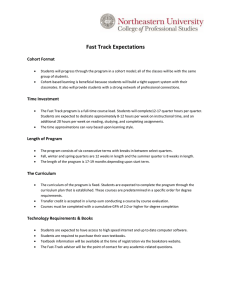Western Illinois University Bachelor of Arts in General Studies
advertisement

Western Illinois University Bachelor of Arts in General Studies Macomb Campus Advisors: Ron Pettigrew, Jinny Page, Colin Rogness, Jennifer Tibbitts Office: Horrabin Hall 6 Phone: 309-298-1929 Quad Cites Campus Advisors: Jacquelyn Holan, Kenny Wheeler Phone: 309-762-1988 CONTACTING YOUR ADVISOR: We encourage you to contact your advisor by email. We can schedule a phone or office visit if necessary. If you cannot reach them you can also use our general office e-mail bgs@wiu.edu . IMPORTANT RESOURCES YOU ARE REQUIRED TO LEARN TO USE: WARD report, STARS, WIU email system (ZIMBRA), University Undergraduate Catalog, WIU Student Handbook, University directory of faculty and staff Academic Advising Description/Definition Academic advising is a collaborative educational process whereby you, the student, and an advisor are partners in meeting essential learning outcomes, ensuring student academic success, and outlining steps for students to achieve their personal, academic, and career goals. This partnership requires participation and involvement of both you and your advisor as it grows throughout your entire educational experience at the University. Both you and your advisor have clear responsibilities for ensuring the advising partnership is successful. ADVISEE RESPONSIBILITIES – WHAT YOU ARE EXPECTED TO DO As an advisee, you have clear responsibilities in the advising partnership. In order to be successful: • Check your ECOM/WIU Zimbra email account regularly. • Learn to utilize the STARS student record system. • Learn how to interpret the catalog and WARD. • Be courteous and plan ahead. The BGS degree does not require you meet with your advisor prior to registration, BUT, it is in your best interest to discuss your registration plans in advance with your advisor. • Contact your advisor whenever you have questions. Do not expect them to contact you. • Register in a timely manner. • Be open to developing and clarifying your personal interests, values, and goals. • Research college programs, policies, procedures, and opportunities as appropriate. • Keep a record of your academic progress and goals. • Accept responsibility for your decisions and your actions (or inactions) that affect your educational progress and goals. EXPECTED STUDENT LEARNING OUTCOMES FOR THE ACADEMIC ADVISING EXPERIENCE At Western Illinois University, academic advising provides you with the opportunity to develop a cooperative academic relationship with an advisor. You and your advisor will work together as you plan your educational career, learn the skills needed for academic success, and how to access the variety of resources and services available at Western Illinois University. Through the academic advising experience at Western Illinois University, the advisee will: • Accurately read and effectively utilize a degree audit (WARD report). • Learn to calculate a grade point average. • Develop an understanding of academic status and grade point average thresholds. • Acquire an understanding of the general education requirements. • Develop an educational plan for successfully achieving goals and select courses each semester to progress toward fulfilling that educational plan. • Utilize the resources and services to assist in achieving academic, personal, and career goals. • Investigate extra-curricular activities and events that will supplement the academic experience. ADVISOR RESPONSIBILITIES – WHAT YOU CAN EXPECT FROM YOUR BGS ADVISOR Your BGS advisor is sensitive to the unique needs of students enrolled in the BGS degree program whose lives may include full or part-time employment, families, community obligations and other responsibilities. Your advisor is aware that BGS students have a desire to develop and increase their knowledge and skills for personal and intellectual development, educational engagement, and lifelong learning. You can expect me as your advisor to: • Treat you with respect and as an adult. • Be accessible for meeting with you during office hours, by appointment, telephone, or email. • Encourage and guide you to define and develop clear and realistic educational goals. • Provide a safe space in which to share your thoughts, aspirations, concerns, and interests. • Maintain confidentiality. • Listen carefully to your questions and concerns. • Understand and effectively communicate the curriculum, graduation requirements, and university and college policies and procedures through use of the catalog and WARD reports. • Monitor and accurately document your progress toward meeting your degree requirements. • Assist you in gaining decision-making skills and in assuming responsibility for your educational plans and decisions. • Assist you in making course and major decisions. • Encourage you to work closely with your professors/instructors. • Provide educational resources and referrals when appropriate. • Encourage you to participate in extra-curricular activities and events.



